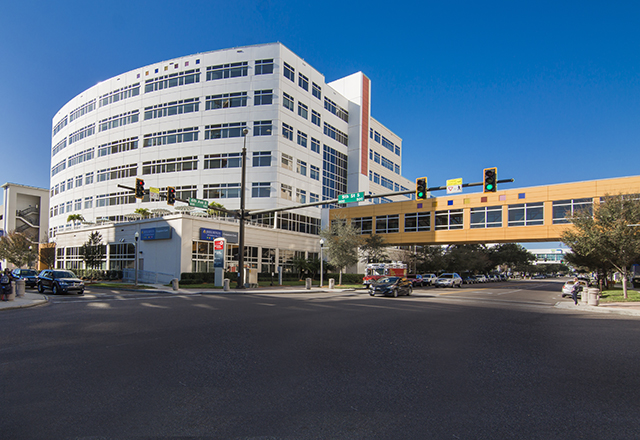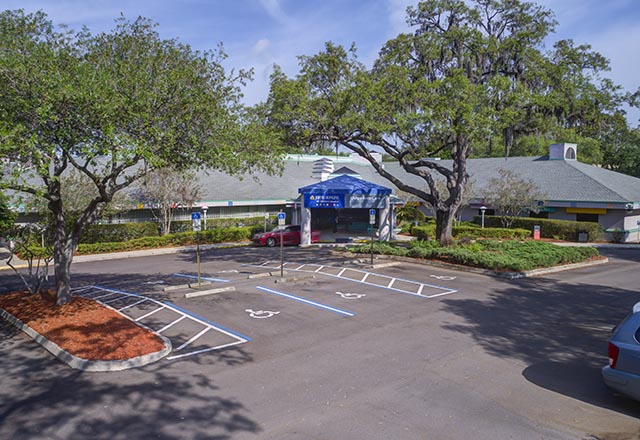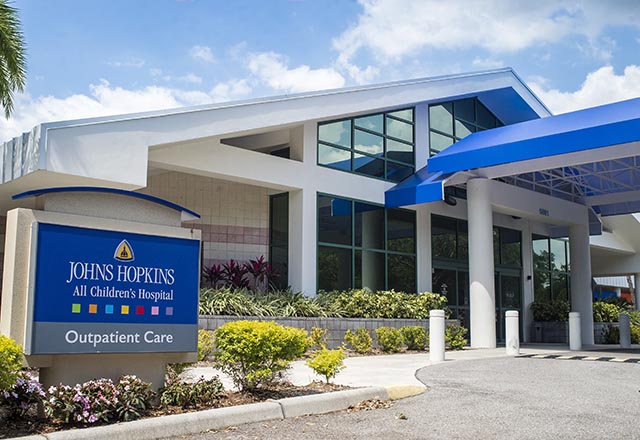Head Shape Clinic
The Head Shape Clinic at Johns Hopkins All Children’s Hospital in St. Petersburg, Florida, is organized by the Divisions of Neurosurgery, Plastic Surgery and Rehabilitative Medicine. Our physicians are experienced in diagnosing and treating infants and children of all ages with abnormal head shapes related to a wide variety of conditions, most commonly positional plagiocephaly (flat head), but also craniosynostosis and craniofacial syndromes. Patients are evaluated by a specialist with expertise in diagnosing and treating children with abnormalities of the skull.
Head Shape Evaluation
Our multidisciplinary approach allows patients to be assessed from multiple perspectives, allowing evaluation and management of multiple aspects of the care involved in the child with a concerning head shape.
A neurosurgeon, plastic surgeon or rehabilitative medicine physician evaluates the child to rule out conditions such as craniosynostosis, which would require prompt evaluation and treatment by our team. X-rays or CT scans are usually not required, but they can be performed, if necessary, in select cases.
Once screened for more serious conditions, the child’s positional plagiocephaly is thoroughly assessed by the multidisciplinary team.
A pediatric physical therapist screens patients for torticollis and other neuromuscular disorders that can cause deformation of the skull and lead to other developmental delays. Based on clinical results, therapists will make recommendations for evaluation and follow-up treatment consistent with professional best practice standards. Physical therapists also will provide education on positioning to reduce plagiocephaly and/or torticollis with conservative treatment.
An orthotist evaluates the patient when the surgeon and the family agree that the child may be a good candidate for treatment of deformational plagiocephaly with a helmet. This gives the family an opportunity to learn more about helmet therapy and treatment.
For patients with craniosynostosis, our neurosurgery and craniofacial surgeons offer the latest in minimally invasive, distraction and open reconstructive techniques.
Why Choose Johns Hopkins All Children’s Hospital if Your Child Needs Surgery for Head Shape Abnormality
Our comprehensive Cleft and Craniofacial Center has been a leader in craniofacial surgery in Florida for over 30 years. Our program is the only craniofacial program on the West Coast of Florida offering minimally invasive surgical techniques for craniosynostosis. While the vast majority of children evaluated in the Head Shape Clinic do not require surgery, our team is very experienced in a wide array of surgical procedures to correct abnormalities such as craniosynostosis.
Our surgeons were some of the first in the United States to adopt minimally invasive techniques more than a decade ago. They have continued to refine these techniques, which include endoscopic surgery, the use of distractors and other reconstructive techniques. These operations, performed through small incisions, allow the routine performance of craniofacial operations with less than one hour of surgery with minimal blood loss, very little chance of blood transfusion and only an overnight stay in the hospital. For the right patient, these minimally invasive techniques offer great advantages in the treatment of patients with craniosynostosis, which have traditionally required lengthy surgery, more blood loss, a reasonable chance of blood transfusion, extensive postoperative swelling and a multiple day hospitalization.
Conditions We Treat
Our multispecialty group has extensive experience treating all types of head shape anomalies and their associated conditions. Most patients do not require surgery.
Our Approach to Positional Plagiocephaly (Flat Head Syndrome or Deformational Plagiocephaly)
Plagiocephaly is characterized by a flattening of one side of the head, resulting in skull asymmetry. Plagiocephaly is most commonly caused by deformation of the skull related to positioning – often referred to as positional plagiocephaly, positional head deformity or the “Flat Head Syndrome” – which does not require surgery.
It is an extremely common condition and is easily treated if diagnosed and addressed early. Since babies were recommended to sleep on their backs in the 1990s, there has been a large increase in the number of children with “Flat Head Syndrome,” which is frequently associated with torticollis or limited range of motion of the neck muscles. Most cases are successfully managed with neck stretching exercises, tummy time and repositioning. For patients with particularly severe cases, physical therapy and helmet therapy are sometimes necessary.
While positional head deformity and craniosynostosis can be distinguished by X-ray or CT scan, both tests require a small amount of radiation exposure for the child. One of the primary advantages of the Head Shape Clinic is the ability of our experienced team to distinguish craniosynostosis from positional plagiocephaly without the use of X-ray or CT scan. These tests may be required in some patients, but the majority of children can be diagnosed by our team based on history and physical assessment alone.
Our Approach to Craniosynostosis
The normal skull is composed of multiple plate-like bones that are joined together by fibrous sutures. Once growth is complete during the first years of life, these sutures fuse and the skull becomes one bone. Craniosynostosis occurs when one or more of these sutures fuse prematurely, restricting skull and brain growth and causing an abnormal head shape. Craniosynostosis is one of the most common craniofacial birth defects and occurs in about 1 in 2,000 births.
Our Approach to Torticollis
Torticollis is a tightening of a child's neck muscles, which causes the head to tilt to one side and turn to the other side. This can make it difficult for children to turn their head for visual tracking, hold their head in an upright position and perform appropriate upper extremity movements necessary for feeding and play. It can also affect flattening of the child's face, ear and head and make it difficult to clean the neck and shoulder. Torticollis is a neuromuscular condition that can be treated effectively with early involvement of physical therapy. The physical therapist will perform an evaluation to assess the child's passive range of motion, active range of motion, muscle tightness, muscle strength and gross motor skills. The physical therapist also will check for other conditions such as plagiocephaly, hip dysplasia (misalignment of the hip joint) and spine problems and then discuss the results with the family. If needed, a physical therapy plan is designed specifically for the child's needs.
Contact Us
For more information or to make an appointment, please give us a call at the phone number below. We serve families in the greater Tampa Bay area and beyond.
Give us a call
Call 727-767-8181
Our Locations
-
Outpatient Care Center
Johns Hopkins All Children's Hospital 601 5th Street South, St. Petersburg, FL 33701

-
Johns Hopkins All Children's Outpatient Care
Tampa 12220 Bruce B Downs Blvd., Tampa, FL 33612

-
Johns Hopkins All Children's Outpatient Care
Sarasota 5881 Rand Blvd., Sarasota, FL 34238


